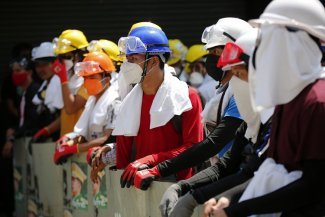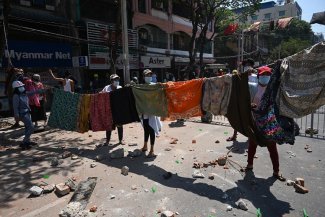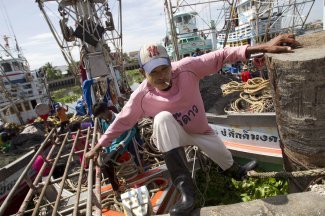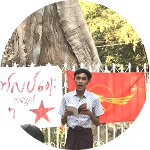
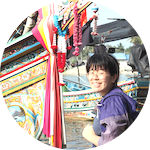
Ko Toe*, a former policeman in Myanmar, joined the Civil Disobedience Movement after the February 2021 coup in protest against Myanmar’s military junta. He now lives as an undocumented migrant in Thailand where he, and other ‘CDMers’ as they are known, make handmade bags to financially support themselves and the revolution.
Ko Toe* was proud to be a police officer, working to maintain public order in Yangon. But all that changed when Myanmar’s military junta, led by General Min Aung Hlaing, staged a coup d’etat on 1 February 2021. Today Ko Toe lives his life on the other side of the law, as an ‘illegal’ person, as undocumented migrants in Thailand are commonly branded.
After a month of witnessing civilians being violently oppressed by soldiers, he decided to stop work and join the decentralised, non-violent, grassroots Civil Disobedience Movement (CDM), which uses various forms of direct action – including strikes, protests, demonstrations, the non-payment of bills and the boycotting of businesses linked to the military – to stand up to the regime.
“We were no longer clean enough to wear a police uniform because the uniform I was wearing couldn’t protect the people – instead it was torturing them,” recalls Ko Toe, who first fled Yangon and sought refuge in the mountains with the Karen National Union, a powerful ethnic armed group which has long agitated for the self-determination of the Karen people, and now provides military training to anti-coup activists.
Still not feeling safe, a year later he decided to make the crossing to Mae Sot, one of the Thai border towns closest to Myanmar in Tak province. Surviving without legal documents, Ko Toe has abandoned his old life and now lives under the radar with a few other CDMers, as members of the CDM are called. Along with a group of former teachers, nurses and reporters he lives in a small house where they sell handmade bags to support themselves and the revolution.
According to data from various human rights organisations, more than 3,000 people have been killed, close to 20,000 people have been arrested, and almost 1.4 million people have been displaced since the Tatmadaw, Myanmar’s military, overthrew the elected civilian government in February 2021 and detained President Win Myint and State Counsellor Aung San Suu Kyi along with various ministers and members of parliament. But the actual figures are believed to be much higher as accurate information from inside Myanmar is very difficult to obtain.
The political crackdown has had severe economic repercussions, thanks to six rounds of European Union sanctions and the widespread divestment of foreign investors. As a result, the kyat has rapidly depreciated, while the cost of living in Myanmar has skyrocketed.
An exodus of workers
Trapped in a cycle of five decades of military dictatorship (1962-2011), Burmese people of working age have long sought better job opportunities outside the country, particularly in neighbouring Thailand where they make up more than half of the country’s migrant workforce and are concentrated in industries like agriculture, fisheries, construction and the service sector.
After 2011, Myanmar engaged in a semi-controlled path to democracy and many Burmese migrant workers returned home to set up businesses, thanks to the skills and capital they acquired while working abroad. But the recent coup has disrupted this trend.
Instead, the number of Burmese migrant workers in Thailand has surged. In December 2020, there were officially 1,574,324 Burmese migrant workers in Thailand’s labour registration system. Two years later, there were 1,981,739. Significantly more are thought to be working unregistered and informally.
However, the political crackdown in Myanmar is not the only cause of this exodus. Myanmar and Thailand have also been dealing with the social and economic fallout of the Covid-19 pandemic.
After the first positive case was recorded in January 2020, Thailand shut down its external borders and implemented travel restrictions inside the country. This resulted in tens of thousands of Burmese migrants being barred from their regular trips between the two countries, and being trapped either in Thailand or in Myanmar, particularly in the border towns.
After normal activity resumed in Thailand in 2022, some migrant workers tried to return to their adopted home legally under a Memorandum of Understanding (MOU) signed between the two countries in a bilateral effort to connect migrant workers in Myanmar with employers in Thailand. In addition, irregular workers also have the possibility to register, during one of Thailand’s migrant worker registration amnesties, for a ‘pink card’, a document that allows them to work legally in Thailand for a certain timeframe. However, the process – where the Thai government makes an open call for Thai employers to register the irregular migrant workers employed by them – has been described as “unnecessarily complicated and prone to corruption”.
Burmese migrant workers often endure a range of abuses, from exploitation by brokers and recruitment agents to wage theft, poor living and working conditions, and even forced labour. They also face significant obstacles to obtaining the correct documents to live and work in Thailand.
Ko Toe, like many other migrants, is undocumented and says he is unable to get the correct legal documents to live and work in Thailand because he lacks clear information about the process or the financial resources to complete it. “A migrant worker does not have the rights which every human being should have,” he reflects.
The blurred line between refugees and economic migrants
In theory, there are two types of migrants: people who are forced to migrate, because of uncontrollable forces like war and climate change, and those who voluntarily migrate to seek better life and work opportunities. “However, in practice, the line between those two types isn’t clear cut,” says Dr. Sirada Khemanitthathai, an academic from Chiang Mai University in Thailand who specialises in migration.
According to Sirada, the migratory patterns of Burmese people has changed in these past two years. Under the rule of the National League for Democracy party, led by Aung San Suu Kyi, many Burmese people became migrant workers to seek better job opportunities with future plans to return home. But now, many of them like Ko Toe are driven by in-between factors.
“You can’t stop people from migrating from the political and economic upheaval, which is the driving force that pushes them out from their home country. Meanwhile, there is also the demand for labour in Thailand, which is a magnetising force,” says Sirada.
However, Thai officials have avoided addressing the correlation between political push factors and Burmese migration. “Thailand doesn’t have a registration channel for refugees. If you are in the temporary shelters at the border, it means that you are a displaced person, but if you are outside, you fit in as a migrant worker,” explains Sirada. Thailand has never officially recognised the refugees status of the more than 90,000 people residing in nine UNHCR camps along the Thai-Myanmar border since the 1990s, and it is not a signatory to a number of international agreements on the rights of refugees.
Sirada emphasises that the Thai state doesn’t recognise political refugees and wants to decouple migration from the politics in Myanmar. Links between Thai leaders and the Burmese junta have been regularly reported.
“The political change in Myanmar doesn’t impact our management of migrants but instead what has impacted is the Covid,” claims Jumnong Songkaorop, director of the Foreign Workers Administration Office, a subdivision under Thailand’s Ministry of Labour, in an interview with Equal Times. “There are Burmese migrants impacted by Covid-19 and who illegally crossed to Thailand. We allow them to work and legalise their status. This is all due to the disruption caused by the pandemic.”
With the improving pandemic situation, Thailand and Myanmar reopened the Friendship Bridge between Mae Sot and Myawaddy in January 2023. It is the first Thailand-Myanmar cross-border point to reopen after almost three years. But as of today, only migrants registered under the MOU system are able to cross.
“If you don’t like it here, go back and face the shooting”
As the main town of the Tak Province Special Economic Zone, Mae Sot ranks as one of the top destinations for undocumented and documented migrant workers from Myanmar as well as Thailand’s neighbouring countries of Laos and Cambodia. The town’s factories contribute significantly to the garment supply chain for big brands, and they are frequently in the spotlight for exploiting undocumented migrants by underpaying them and providing poor working conditions.
The life of so-called revolutionary heroes like Ko Toe is not easy. Many CDMers end up being manual workers in foreign countries despite being highly skilled. “I had never thought about sewing before,” says 29-year-old Ko Toe. “I had never even seen a sewing machine up close. As a police officer, my job was to serve the people, but now I sew because of the difficulties. I am just trying to make the best of a difficult situation.”
Because they cannot work legally, his ad-hoc collective makes money by producing handmade bags under the name CDM Unity. Shipping to several countries around the world, their customers range from members of the Burmese diaspora to some foreign supporters. However, they barely make ends meet. The ongoing war in Ukraine has shifted the world’s attention from the cause of Myanmar.
CDMers usually receive some financial support from the National Unity Government, the pro-democracy parallel government formed in exile with former elected lawmakers from the 2020 elections. From a 205,000 MMK (approximately US$98) salary as a police officer, Ko Toe now receives 62,324 MMK (approximately US$ 29.75) monthly, an amount that equals to three days of the legal minimum wage in Thailand.
But things are not going smoothly for those who are not deeply involved in the resistance either. Ma Khin Htar*, a 28-year-old woman from Rakhine state, is currently looking for work in Mae Sot. Once a legal worker in a garment factory, she became undocumented in 2022 because she couldn’t afford a plane ticket to Thailand – the only possible way to travel during the border shutdowns.
“It is not easy to get a job because I don’t have legal documents,” confides Ma Khin Htar, who sold her property to fund her most recent trip to Thailand. She has to bear many costs due to her undocumented status, ranging from paying brokers to take her across the border to regularly paying Thai police officers to avoid arrest and deportation.
“But staying in Thailand is still better. I can support my family which is struggling because of the wars [the post-coup fighting and the suppression of the Rohingya] in Rakhine.” The northern region on the border with Bangladesh has long been plagued by a civil war between an ethnic armed group fighting for autonomy and the central government. This fight has intensified since the coup.
Ko Sai, a Burmese labour rights activist based in Mae Sot, points out that the uncertainty in Myanmar has reduced the options available to workers. In many of the cases that he takes care of, the workers decide to remain in jobs with poor conditions because they do not want to return to Myanmar. “‘If you don’t like it, then go back and face the shooting’ – this is what an employer told [some Burmese workers].”
But there is no clear sign that the situation in Myanmar will improve. On 1 February 2023, two years after their seizure of power, the Myanmar military extended the term of their State Administration Council regime for another six months. As a result, the election they had announced for August will likely be further postponed. Battles between military forces and numerous revolutionary groups are still spread across the country.
“It is time for Thailand to come up with long-term policies for Burmese refugees and migrant workers. This situation may continue for more than ten years,” warns Thai academic Sirada.



